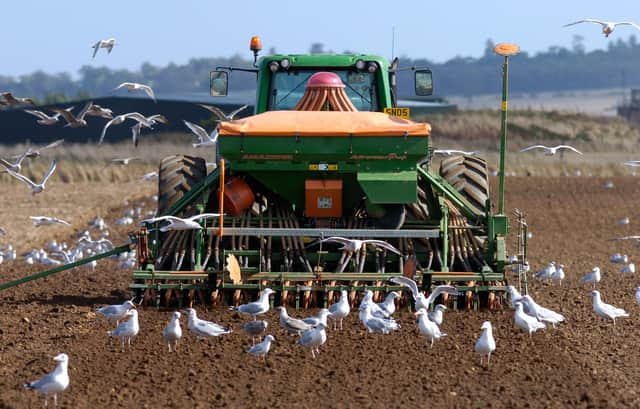Farming: Springtime’s usual air of optimism is in very short supply this year - Andrew Arbuckle


But this year, prospects down on the farm are clouded with unprecedented – and that word is not used lightly – challenges.
These trials do not refer to the difficulties faced by the weather and for those claiming recent sunny days has seen us through the worst our traditionally benign climate can throw at us, should remember ‘the beast from the East’ It landed in our country in March several years ago.
Advertisement
Hide AdAdvertisement
Hide AdNo, the extraordinary ripples in farming costs and commodities brought about by the Russian invasion of Ukraine have seen carefully thought out and costed plans thrown out of the window.
Up and down the country cash flows prepared in the depths of winter before the military conflict began are being scrunched up and consigned to the waste bucket
Looking at the expenditure side of the balance sheet who could have predicted fertiliser costing close to £1,000 per tonne and even then, there is a big question mark on whether it will be available.
Like the wise virgins who carefully trimmed their lamps the night before, many farmers already have their 2022 fertiliser requirements in store but equally many other farmers have traditionally bought their nitrogen just before it is needed.
Regardless of any individual’s situation, everyone has the major problem of deciding what to do. If there is a stack of fertiliser in your store, do you blindly go ahead as if nothing has changed, and hope it will be back to normal next year or do you carefully tend what you have and eke it out until we return to more normal times; if that is possible.
One thing you should do is put extra padlocks on the doors and additional security lights around the building as the light fingered brigade are pretty alert to any thieving opportunity.
And that is only one item on the future balance sheet. Farms, especially those with high power requirements have seen their fuel costs rise to unprecedented – it’s that word again – levels.
Previously I have watched teams of tractors and machinery working in a field planting potatoes. It was quite easy to count more than one thousand horsepower being used in this multi-tractor exercise. How the potato grower will trim that expenditure is difficult to guess but it will likely involve cutting out anything other than the best of land.
Advertisement
Hide AdAdvertisement
Hide AdThe same retraction to only producing on the best of land or with top quality of livestock is very likely to result in a much reduced farming industry.
Expenditure on fuel and fertiliser are but two of the rocketing costs faced by farmers while every item on the expenditure side of the balance sheet will also cost more than it did a year ago.
There will be optimists that say, “but look at the future price of grain/milk/beef/lamb” and add that increases in the end prices will more than cancel out increases in costs.
They well might be optimists, but they are sadly not realists. That is why the NFUS list of demands to both the UK and Scottish governments based on improving stability in the farming industry are so important. The requests from the union cover such matters as freezing fuel duty and allowing more seasonal workers into the country. Neither would destabilise the UK government.
North of the border, if there was a temporary suspension of the Ecological Focus Areas component of the 2022 Greening requirements it would bring additional arable land back into productive use. Scotland could also implement a rapid and continuous food production impact assessment of all existing and new legislation and policy affecting agricultural land use and practice, by implementing a food security impact.
It will be interesting to see if either government offers anything other than a deaf ear to the unique problems facing the farming industry.
The comment above does not mention the millions of other people all around the world faced with massive problems of accessing sufficient food to eat as a result of the bloody and unnecessary conflict.
A message from the Editor
Thank you for reading this article. We're more reliant on your support than ever as the shift in consumer habits brought about by coronavirus impacts our advertisers. If you haven't already, please consider supporting our trusted, fact-checked journalism by taking out a digital subscription. Click on this link for more information.
Comments
Want to join the conversation? Please or to comment on this article.
